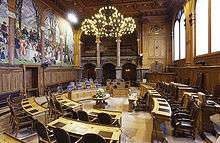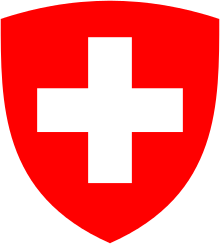Council of States (Switzerland)
The Council of States (German: Ständerat, French: Conseil des États, Italian: Consiglio degli Stati, Romansh: Cussegl dals Stadis) is the smaller chamber of the Federal Assembly of Switzerland. It is considered the Assembly's upper house, with the National Council being the lower house. It comprises 46 members.[1]
Council of States | |
|---|---|
 | |
| Type | |
| Type | |
| Leadership | |
President | |
First Vice President | |
Second Vice President | |
| Structure | |
| Seats | 46 |
 | |
Political groups | Government parties (41)
Other parliamentary parties (5) |
| Elections | |
Last election | October–November 2019 |
| Meeting place | |
 | |
| Federal Palace of Switzerland, Bern | |
| Website | |
| http://www.parliament.ch/ | |
.svg.png) |
|---|
| This article is part of a series on the politics and government of Switzerland |
|
|
Twenty of the country's cantons are represented by two Councillors each. Six cantons, traditionally called "half cantons", are represented by one Councillor each for historical reasons. These are Obwalden, Nidwalden, Basel-Stadt, Basel-Landschaft, Appenzell Ausserrhoden and Appenzell Innerrhoden.[2]
The Councillors serve for four years, and are not bound in their vote to instructions from the cantonal authorities.
Elections
Under the Swiss Federal Constitution, the mode of election to the Council of States is left to the cantons, the provision being that it must be a democratic method. All cantons now provide for the councillors to be chosen by popular election, although historically it was typically the cantons' legislatures that elected representatives to Bern. However, eligibility to vote varies according to the applicable cantonal law. One notable variation is that qualified foreigners may vote in Neuchâtel and Jura[3], and the minimum voting age is 16 in Glarus.
In all the cantons except Appenzell Innerrhoden the councillors are elected concurrently with the members of the National Council. In Appenzell Innerrhoden the representative is elected by the popular assembly (Landsgemeinde) during the April before the national vote.
With the exception of the cantons of Neuchâtel and Jura, which have proportional representation, councilors of state are elected by majority vote in either one or two rounds of voting.[4]
Working languages
In debates, councilors can choose any of the federal languages, usually the one they are most proficient in: German, French, Italian, or Romansh.[5] German (High German) and French are the most frequently used.
Voting
Issues before the council pass with a majority of the votes cast. The president of the council typically does not vote, unless there is a tie. In three cases, votes require a majority of the council members in order to pass, emergency legislation, votes on subsidies, guarantees, or any expenditure of more than 20 million CHF on a non-recurring basis, or 2 million CHF on a recurring basis. In any case, where a majority of the council is required, the president of the council will vote.[6]
Until 2014, votes in the chamber were conducted with members raising their hands to be counted. After Politnetz, a Swiss political information platform, recorded a 2012 vote regarding an import ban on reptile skins, it found that the official vote count differed from what was shown in the video.[7] In what was called "Stöckligate", Politnetz, shows that several votes on the matter all resulted in miscounts.[8] (The name Stöckligate refers to a colloquial name for the Council of States. A stöckli is a second home built on a farm for the elder farmer after the property has been deeded to the heirs. The name is applied to the chamber as it is viewed as having older members than the National Council.)[9]. As a result of the affair, council member This Jenny introduced a bill to require electronic voting.[7]
Since 1 March 2014, votes in the Council of states are conducted electronically with a tally shown on electronic display boards. The rule changes also allowed for disclosure of how members voted. The recorded votes are made public for votes on votes on overall bills, final votes, or voted that require a qualified majority. Names and votes will be published if 10 members make the request.[10]
Membership
Council members earn a base salary of 26,000 CHF per year plus a 440 CHF per diem for attending sessions of the council or the committees. Members also receive 33,000 CHF per year for staff and material expenses. Members also receive food, travel and hotel allowances and a pension contribution. The Swiss government estimates that a member typically receives 130,000 to 150,000 CHF per year.[11]
Seats by party
Seats by party at the Council of States of Switzerland (2003-2019)
| Parties | Ideology | 2003 | 2007 | 2011 | 2015 | 2019 | |
|---|---|---|---|---|---|---|---|
| Christian Democratic People's Party (CVP/PDC) | Christian democracy | 15 | 15 | 13 | 13 | 13 | |
| FDP.The Liberals (FDP/PRD) | Classical liberalism | 14 | 12 | 11 | 13 | 12 | |
| Social Democratic Party (SPS/PSS) | Social democracy | 9 | 9 | 11 | 12 | 9 | |
| Swiss People's Party (SVP/UDC) | National conservatism | 8 | 7 | 5 | 5 | 6 | |
| Green Party (GPS/PES) | Green politics | 2 | 2 | 1 | 5 | ||
| Green Liberal Party (GLP/PVL) | Green liberalism | 1 | 2 | ||||
| Conservative Democratic Party (BDP/PBD) | Conservatism / Economic liberalism | 1 | 1 | ||||
| Independent | Independent | 1 | 1 | 1 | |||
| Total | 46 | 46 | 46 | 46 | 46 | ||
Population per seat
The Council of States represents the federal nature of Switzerland: seats are distributed by state (canton), not by population. Most cantons send 2 representatives, while the historic half-cantons; Appenzell Ausserrhoden, Appenzell Innerrhoden, Obwalden, Nidwalden, Basel-Stadt and Basel-Landshaft, each send one.[2] Consequently, the number of people represented by a single seat in the Council of State varies by a factor of 45.8, from 15,000 for the half-canton of Appenzell Innerrhoden to 733,050 for each of the two seats for the canton of Zurich.
| Abbr | Canton | Seats | Population ¹ | per seat | ² |
|---|---|---|---|---|---|
| ZH | Zurich | 2 | 1,466,100 | 733,050 | 1.0 |
| BE | Berne | 2 | 1,017,200 | 508,600 | 1.4 |
| VD | Vaud | 2 | 773,200 | 386,600 | 1.9 |
| AG | Aargau | 2 | 653,500 | 326,750 | 2.2 |
| BL | Basel-Landschaft | 1 | 283,200 | 283,200 | 2.6 |
| SG | St. Gall | 2 | 499,000 | 249,500 | 2.9 |
| GE | Geneva | 2 | 484,400 | 242,200 | 3.0 |
| LU | Lucerne | 2 | 398,700 | 199,350 | 3.7 |
| BS | Basel-Stadt | 1 | 191,800 | 191,800 | 3.8 |
| TI | Ticino | 2 | 351,900 | 175,950 | 4.2 |
| VS | Valais | 2 | 335,600 | 167,800 | 4.4 |
| FR | Fribourg | 2 | 307,400 | 153,700 | 4.8 |
| TG | Thurgau | 2 | 267,400 | 133,700 | 5.5 |
| SO | Solothurn | 2 | 266,400 | 133,200 | 5.5 |
| GR | Grisons | 2 | 196,600 | 98,300 | 7.5 |
| NE | Neuchâtel | 2 | 178,100 | 89,050 | 8.2 |
| SZ | Schwyz | 2 | 154,100 | 77,050 | 9.5 |
| ZG | Zug | 2 | 122,100 | 61,050 | 12.0 |
| AR | Appenzell Ausserrhoden | 1 | 54,500 | 54,500 | 13.5 |
| NW | Nidwalden | 1 | 42,400 | 42,400 | 17.3 |
| SH | Schaffhausen | 2 | 79,800 | 39,900 | 18.4 |
| OW | Obwalden | 1 | 37,100 | 37,100 | 19.8 |
| JU | Jura | 2 | 72,800 | 36,400 | 20.1 |
| GL | Glarus | 2 | 40,000 | 20,000 | 36.7 |
| UR | Uri | 2 | 36,000 | 18,000 | 40.7 |
| AI | Appenzell Innerrhoden | 1 | 16,000 | 16,000 | 45.8 |
| Overall | 46 | 8,325,200 | 180,983 | 4.1 | |
Notes: ¹ Population data from 2015 ([12]). ² Relative representation compared to Zürich.
Notes and references
Notes
References
- "The Council of States" (official site). Berne, Switzerland: The Swiss Parliament. Retrieved 9 August 2016.
- "Member of the Council of States by Canton" (official site). Berne, Switzerland: The Swiss Parliament. Retrieved 9 August 2016.
- "Gemeinden und Kantone mit Stimm- und Wahlrecht für Ausländer". www.bfs.admin.ch (in German). Bundesamt für Statistik. Retrieved 5 November 2019.
- "Elections 2015:How the elections to the Council of States are organised: process, rules and principal stages". ch.ch – A service of the Confederation, cantons and communes (official site). Berne, Switzerland: The Swiss Confederation. Retrieved 9 August 2016.
- "Art. 8 Bundesversammlung, SR 441.1 SpG (Bundesgesetz über die Landessprachen und die Verständigung zwischen den Sprachgemeinschaften)" (official site) (in German, French, Italian, and Romansh). Berne, Switzerland: The Swiss Federal Council. Retrieved 9 August 2016.
- "Lexikon of Parliamentary Terms". Parliament of Switzerland. Retrieved 7 August 2020.
- "Jenny fordert neue Abstimmung über elektronische Stimmabgabe". Tages Anzeiger (in German). 12 October 2012.
- "Politnetz darf weiter im Ständerat filmen – vorerst". Blick (in German). 10 December 2012.
- Adrian Vatter (29 June 2018). Das politische System der Schweiz (in German). Nomos Verlag. p. 342.
- "Standing Orders of the Council of States". Government of Switzerland. Retrieved 1 August 2020.
- "Salary of the members of parliament". Swiss Confederation. Retrieved 6 August 2020.
- Population data 2015 Archived 5 March 2011 at the Wayback Machine accessed 28 July 2016
See also
- List of members of the Swiss Council of States (2019–2023)
- List of Presidents of the Swiss Council of States
Bibliography
- The Swiss Confederation – A Brief Guide 2015, Berne, Switzerland: Swiss Confederation, Swiss Federal Chancellery FCh of the Federal Chancellor Corina Casanova, 28 April 2015, archived from the original (PDF) on 14 May 2013, retrieved 4 January 2016
External links
| Wikimedia Commons has media related to Swiss Council of States. |
- Official website—(in English)
- The Swiss Parliament—(in English)
- The Law Collection: SR 17 Bundesbehörden/Autorités fédérales/Autorità federali—(in German)
